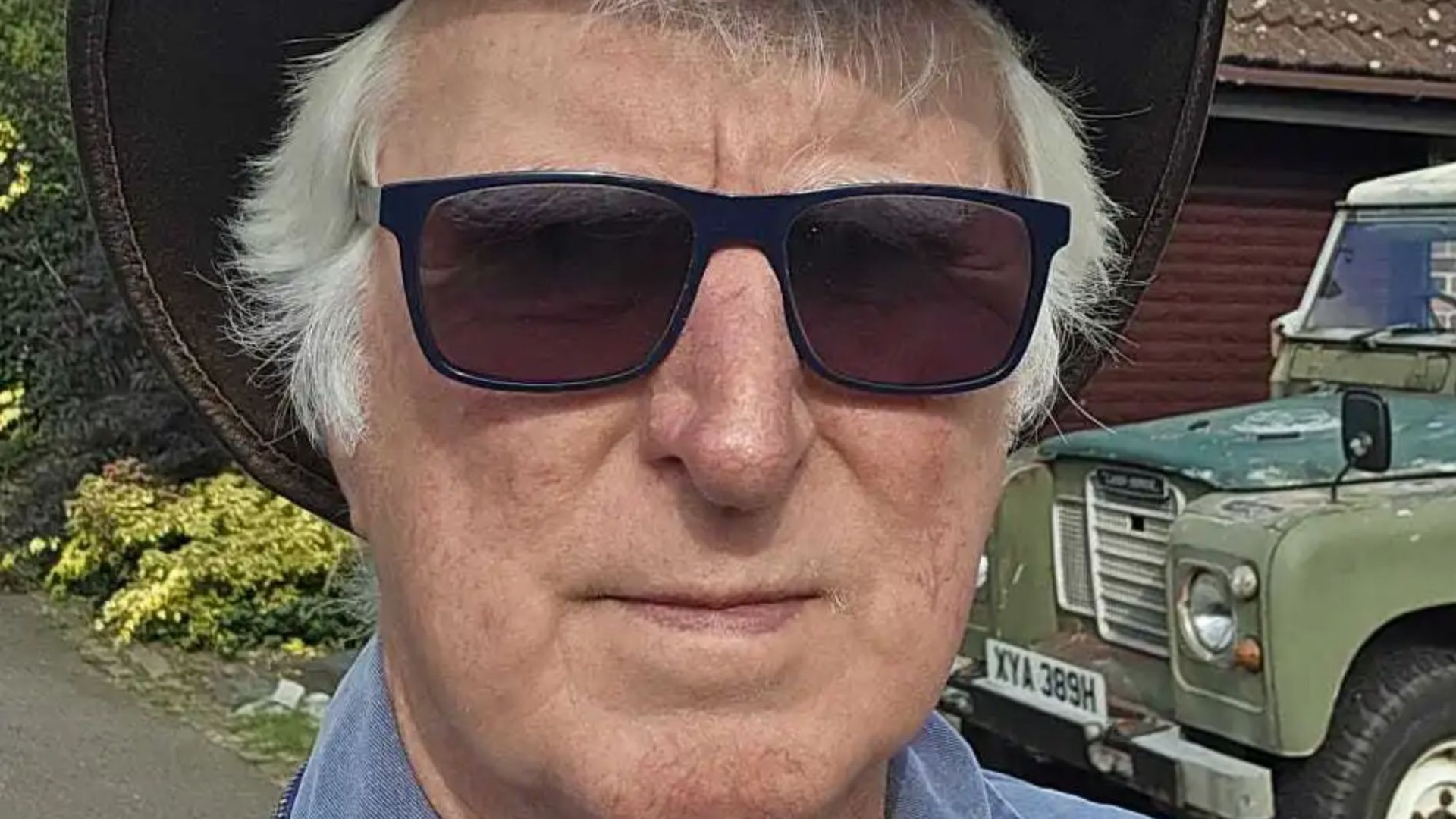ALASTAIR Cook was told he had terminal liver cancer in July 2024.
His devastating diagnosis was caused by a ‘silent killer’ virus he got after a traumatic car crash almost four decades earlier.
9

9

9
The 67-year-old, from Bishop’s Stortford, Hertfordshire, contracted hepatitis C in 1981 when he was working in the oil industry as an exploration geologist in Kuwait.
After being involved in an accident that left him with life-threatening injuries, Alastair was rushed to hospital and given a blood transfusion.
He later found out that the blood used was contaminated with hepatitis C – a virus that can cause serious damage to the liver if left untreated.
Many people won’t have symptoms for months or years after they pick up hepatitis C but, over time, it can lead to scarring of the liver – called cirrhosis – and liver cancer, which can be fatal.
Read more on liver cancer
It is therefore often dubbed a ‘silent killer’.
Alastair spent the next 34 years in treatment for hepatitis C, enrolling in experimental drug trials.
After tumours were spotted in his liver, he was given just six to nine months to live.
Alastair is undergoing immunotherapy, which he says will just extend his life by a few months rather than eradicate the cancer.
He’s quite matter of fact about his diagnosis, saying: “There’s nothing much I can do.”
But he is urging others who think they might be at risk of the virus to get tested.
“The sooner that they pick it up, the sooner they can get rid of it,” Alastair tells Sun Health.
In the UK, hepatitis C is most commonly spread from sharing needles or syringes when injecting drugs.
It can also be passed on through unprotected sex, as well as razors and piercing needles.
In the past, some people did get the virus through blood transfusions.
All blood transfusions in the UK have been tested and are safe, but the British Liver Trust advises anyone who had a transfusion overseas – or in the UK before 1991 – to ask their doctor for a hepatitis C test.
With recent innovations in treatment, 90 per cent of people with hepatitis C may be cured.

9

9
Alastair spoke to Sun Health after NHS data revealed that cases of liver cancer in England had increased by 5.4 per cent between 2020 and 2022.
Liver cancer incidence across the UK has also surged by 42 per cent over the past decade, Liver Cancer UK warns.
The charity says there’s been a surge in mortality related to liver cancer, with around 5,800 deaths recorded every year.
Vanessa Hebditch, director of policy at the British Liver Trust, says: “We cannot ignore this rising tide of liver cancer.
“Liver cancer is often preventable and the majority of people who are diagnosed will have an underlying liver condition.
“Improving liver health and surveillance of people with liver disease is vital to reduce the number of people losing their lives to liver cancer.”
‘I thought I was going to die’
Alastair graduated from Birmingham University with a degree in Geological Sciences as the oil industry was “starting to take off”.
He completed training in Dallas, Texas, before working as a contractor for oil service companies in Bahrain, Saudi Arabia, Greece, Norway, Nigeria and Libya – “basically all over the place”, Alastair recalls.
“You’d be swapped around from one country to another at the drop of the hat. It was living out of a suitcase,” he adds.
Alastair summed up those years as “loads of money, loads of time off, having a good time”.
In 1981, he found himself working as an exploration geologist in Kuwait, in the deepest oil well that had ever been drilled in the area at the time.
The Kuwait Oil Company had arranged for its crew to be driven back and forth from their staff house in town to the oil rig in the desert.
“That was happening every 12 hours and the driver was working both ends of the clock and moonlighting in between, so he was overly tired,” Alastair says.

9

9
He was being driven to the oil rig on the night of April 24, 1981, when the driver fell asleep at the wheel.
“He went off the road in the desert – there wasn’t tarmac, there was just sand,” Alastair says.
“The car flipped five times and I ended up underneath it. I really thought I was going to die at that point.
“I was trapped by the car so I was trying to crawl out but I couldn’t move.”
Locals who turned up at the site of the crash managed to lift the car off Alastair and drag him out of the wreckage.
“We crashed between the police station and the hospital, which is probably the only reason I survived,” he says.
The exhaust pipe had burned a big hole in my back
Alastair Cook
The driver was killed in the crash and Alastair was rushed to intensive care, having sustained multiple burns and injuries – including four fractured vertebrae, two broken ribs and a punctured lung. He also lost four pints of blood.
Alastair underwent a blood transfusion and it later emerged that the blood he was given at the hospital was contaminated with hepatitis C.
He says the infected blood stocks were supplied to the hospital from the US, which paid high-risk donors, such as prisoners and drug addicts, to give blood.
He knew nothing about hepatitis C or the fact that he’d been given contaminated blood until he was flown back to the UK five weeks later.
“The exhaust pipe had burned a big hole in my back,” Alastair says.
“They were going to do a skin graft, at which point they found out I was getting jaundice and I had hepatitis.
“They couldn’t do the skin graft because of the hepatitis.”
He spent a few more weeks in a London hospital, but it took four months for the scar to heal over.
‘A straw that breaks the camel’s back’
This was just the beginning of Alastair’s battle with hepatitis C.
He continued working in the oil industry for a few more years, being put in charge of eight divisions of a Saudi oil company, before returning to the UK to become an IBM computer dealer.
Alastair later set up his own photographic studio before taking up an administrative position at a school in the early 2000s.
All the while, he was having his health monitored and was diagnosed with testicular cancer in 1984.
“They didn’t know whether to treat the hepatitis first or the cancer,” Alastair recalls.
He underwent surgery to remove the cancer, and Alastair enrolled in a number of hepatitis C drug trials.
What is hepatitis C?
Hepatitis C is a virus that’s passed on through contact with infected blood.
If not treated it can cause serious liver damage, making you feel very unwell.
Over many years, hepatitis C damage can lead to cirrhosis or liver cancer.
More than nine in 10 people with hepatitis C can now get rid of the virus by taking tablets.
These new hepatitis C medicines have been found to make treatment more effective, are easier to tolerate, and have shorter treatment courses.
You might have hepatitis C for many years before you feel unwell, but early treatment can help to prevent liver damage.
Without treatment, the virus can cause inflammation, which can lead to your liver becoming tough and scarred. This is known as “fibrosis”.
Over time, the damage can build up. This can lead to serious liver disease such as cirrhosis or liver cancer.
Symptoms of hepatitis C
After first being infected with hepatitis, most people will have no symptoms but some might experience:
- Fatigue
- Loss of appetite
- Feeling or being sick
- Fever (high temperature over 38C)
- Stomach ache
- Muscle or joint aches and pains
- Jaundice (a yellow colour to your eyes or skin)
Some can get rid of the virus without any treatment, but if you still have the virus six months later this is called “chronic hepatitis”.
Many people only find out that they have hepatitis C once they start to get symptoms of liver disease.
These symptoms include:
- Feeling very tired
- Itchy skin
- Feeling sick
- Joint pains
- Stomach ache and bloating
- Mood changes
- Brain fog and memory problems
- Jaundice (a yellow colour to your eyes or skin)
Source: British Liver Trust
“My way of looking at it was, if they do find a drug and it becomes too expensive, it will take NICE an awfully long time to approve it,” he says.
“So I’m better off going on the trials, in which case if it cures it, I’ll be buying time.”
He adds: “Outwardly, I was fairly good.
“Hepatitis is a bit like a straw that breaks a camel’s back.
“You’re okay to the point where the liver doesn’t function and all of a sudden you shut down.”
Alastair went on three sets of 48-week treatments for interferon medications, which used to be standard treatments for hepatitis C.
He recalls: “It was pretty horrendous to start with. Your immune system would go down to virtually zero.
“You had to try and isolate yourself and you were injecting yourself in the stomach twice a day for 48 weeks.
“You felt like crap, basically.”
Alastair adds: “Nowadays, hepatitis C is far more treatable than it was when I first started.”
But he warns: “A lot of people have got it and don’t know they’ve got it.”
The sooner you’re diagnosed, the sooner doctors can get rid of it
Alastair Cook
Due to having hepatitis C, Alastair was having his liver monitored by ultrasound every six months – which is how he found out he had liver cancer.
Doctors spotted a small tumour in his liver in November last year, which was removed.
But as more tumours emerged following the procedure, Alastair received a terminal diagnosis in July 2024 and was given just six to nine months to live.
The 67-year-old says he isn’t eligible for a liver transplant due to blood clots forming in his portal vein, which carries blood from organs in the abdomen to the liver.
What are the signs of liver cancer?
The most common types of liver cancer in the UK are hepatocellular carcinoma (HCC) and bile duct cancer.
With early HCC, you may not have any symptoms.
As the cancer advances, symptoms may be quite vague, especially if you already have symptoms from other liver disease, such as hepatitis or cirrhosis.
You may just find you:
- Feel sick
- Have no appetite, or feel full after eating very little
- Lose weight without trying
Other symptoms may include:
- Tummy pain
- Abdominal swelling
- Feeling generally unwell and lacking in energy
- Pain in your right shoulder – because the enlarged liver is irritating nerves that supply the shoulder
- Jaundice
As for bile duct cancer, you may again get vague symptoms like feeling sick or loss of appetite.
If the cancer blocks bile ducts, you may develop jaundice.
You may also have
- Itching
- Dark wee
- Pale, putty coloured poo
- Flu-like symptoms of muscle aching, fever and tiredness
Source: Liver Cancer UK
He’s currently undergoing immunotherapy treatment every three weeks.
Alastair says he now feels “accepting” of his situation.
“There’s nothing much I can do,” he explains.
“I am having immunotherapy, but that’s only going to delay it. It’s not going to change the outcome.”
He adds: “I’ve kind of been expecting it for 40 years.”
His wife Denise, 71, on the other hand, “never quite believed [him], so it was more of a shock for her”.
“My wife thinks I’m unemotional, but I’m a realist,” Alastair says.
“I’m slowly coming around to my diagnosis.”
Plea to get tested
Alastair is urging anyone who thinks they might be at risk of hepatitis C to get tested for it.
“The sooner that they pick it up, the sooner they can get rid of it,” he says.
“So if it can be done in three months, you’ve got 34 years of liver damage that you can avoid.”
Hepatitis C is picked up through blood tests.
If you have the virus, you’ll be given anti-viral tablets to take for eight to 12 weeks.
It’s really important to finish the course, to make sure the infection goes away completely.

9

9




